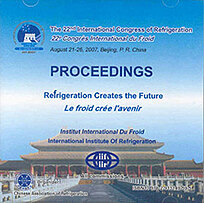
Summary
Heating and cooling in buildings consume about 30% of the primary energy used in China. The most widely applied systems in this aspect are boilers and air conditioning. Heat pumps are the only monovalent action way to satisfy the requirements of heating and cooling in many applications, because they can use renewable energy in the building's surroundings. In this paper, a comparative discussion is given to the effect of climate on applying ground source heat pump system technology. Analysis of the results can lead to the following conclusions: if only extracting heat from the earth, in two months, the soil temperature near the GSHP would be reduced to lower than 20ºC. If only injecting heat for three months, the soil temperature would be over 37°C, which is no longer suitable for air-conditioning. To preserve the ground resource for sustainable utilization as heat source/sink, it should be balanced between the heat injected to the ground and that extracted from the ground. Some measures can be considered in the design for the case of heat imbalance.
Available documents
Format PDF
Pages: ICR07-E2-1344
Available
Public price
20 €
Member price*
Free
* Best rate depending on membership category (see the detailed benefits of individual and corporate memberships).
Details
- Original title: Effect of climatic conditions on the performance of a ground source heat pump system.
- Record ID : 2008-0879
- Languages: English
- Source: ICR 2007. Refrigeration Creates the Future. Proceedings of the 22nd IIR International Congress of Refrigeration.
- Publication date: 2007/08/21
Links
See other articles from the proceedings (839)
See the conference proceedings
Indexing
- Themes: Heat pumps techniques
- Keywords: Ground-water; Temperature; Ground; Heat pump; Parameter; Climate
-
Thermal modelling of groundwater heat pump with...
- Author(s) : NI L., JIANG Y., YAO Y., et al.
- Date : 2007/08/21
- Languages : English
- Source: ICR 2007. Refrigeration Creates the Future. Proceedings of the 22nd IIR International Congress of Refrigeration.
- Formats : PDF
View record
-
Ground heat balance in GSHP.
- Author(s) : MA H., LONG W.
- Date : 2007/08/21
- Languages : English
- Source: ICR 2007. Refrigeration Creates the Future. Proceedings of the 22nd IIR International Congress of Refrigeration.
- Formats : PDF
View record
-
Long-term ground-temperature changes in geo-exc...
- Author(s) : BERNIER M. A., CHAHLA A., PINEL P.
- Date : 2008/06/21
- Languages : English
- Source: ASHRAE Transactions. 2008 Annual Meeting, Salt Lake City, UT. Volume 114, part 2 + CD-ROM.
View record
-
Elementary analysis of influence of groundwater...
- Author(s) : FAN R., YAO Y., JIANG Y., et al.
- Date : 2007/08/21
- Languages : English
- Source: ICR 2007. Refrigeration Creates the Future. Proceedings of the 22nd IIR International Congress of Refrigeration.
- Formats : PDF
View record
-
Study on the freezing characteristics of soil s...
- Author(s) : YANG W., SHI M., CHEN Z.
- Date : 2007/08/21
- Languages : English
- Source: ICR 2007. Refrigeration Creates the Future. Proceedings of the 22nd IIR International Congress of Refrigeration.
- Formats : PDF
View record
